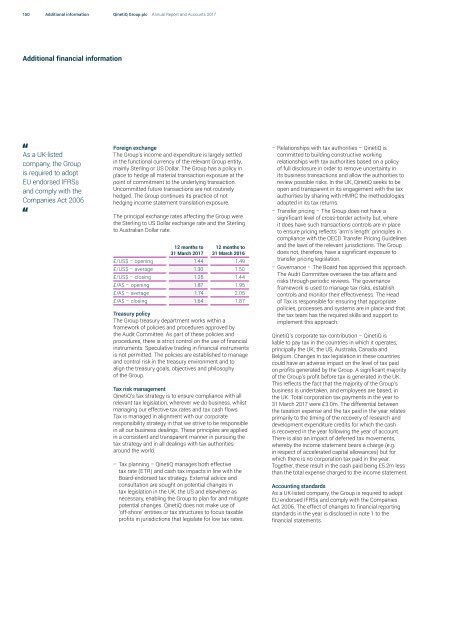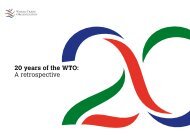QinetiQ Annual Report 2017
You also want an ePaper? Increase the reach of your titles
YUMPU automatically turns print PDFs into web optimized ePapers that Google loves.
150 Additional information <strong>QinetiQ</strong> Group plc <strong>Annual</strong> <strong>Report</strong> and Accounts <strong>2017</strong><br />
Additional financial information<br />
As a UK-listed<br />
company, the Group<br />
is required to adopt<br />
EU endorsed IFRSs<br />
and comply with the<br />
Companies Act 2006<br />
Foreign exchange<br />
The Group’s income and expenditure is largely settled<br />
in the functional currency of the relevant Group entity,<br />
mainly Sterling or US Dollar. The Group has a policy in<br />
place to hedge all material transaction exposure at the<br />
point of commitment to the underlying transaction.<br />
Uncommitted future transactions are not routinely<br />
hedged. The Group continues its practice of not<br />
hedging income statement translation exposure.<br />
The principal exchange rates affecting the Group were<br />
the Sterling to US Dollar exchange rate and the Sterling<br />
to Australian Dollar rate.<br />
12 months to<br />
31 March <strong>2017</strong><br />
12 months to<br />
31 March 2016<br />
£/US$ – opening 1.44 1.49<br />
£/US$ – average 1.30 1.50<br />
£/US$ – closing 1.25 1.44<br />
£/A$ – opening 1.87 1.95<br />
£/A$ – average 1.74 2.05<br />
£/A$ – closing 1.64 1.87<br />
Treasury policy<br />
The Group treasury department works within a<br />
framework of policies and procedures approved by<br />
the Audit Committee. As part of these policies and<br />
procedures, there is strict control on the use of financial<br />
instruments. Speculative trading in financial instruments<br />
is not permitted. The policies are established to manage<br />
and control risk in the treasury environment and to<br />
align the treasury goals, objectives and philosophy<br />
of the Group.<br />
Tax risk management<br />
<strong>QinetiQ</strong>’s tax strategy is to ensure compliance with all<br />
relevant tax legislation, wherever we do business, whilst<br />
managing our effective tax rates and tax cash flows.<br />
Tax is managed in alignment with our corporate<br />
responsibility strategy in that we strive to be responsible<br />
in all our business dealings. These principles are applied<br />
in a consistent and transparent manner in pursuing the<br />
tax strategy and in all dealings with tax authorities<br />
around the world.<br />
––<br />
Tax planning – <strong>QinetiQ</strong> manages both effective<br />
tax rate (ETR) and cash tax impacts in line with the<br />
Board-endorsed tax strategy. External advice and<br />
consultation are sought on potential changes in<br />
tax legislation in the UK, the US and elsewhere as<br />
necessary, enabling the Group to plan for and mitigate<br />
potential changes. <strong>QinetiQ</strong> does not make use of<br />
‘off-shore’ entities or tax structures to focus taxable<br />
profits in jurisdictions that legislate for low tax rates.<br />
––<br />
Relationships with tax authorities – <strong>QinetiQ</strong> is<br />
committed to building constructive working<br />
relationships with tax authorities based on a policy<br />
of full disclosure in order to remove uncertainty in<br />
its business transactions and allow the authorities to<br />
review possible risks. In the UK, <strong>QinetiQ</strong> seeks to be<br />
open and transparent in its engagement with the tax<br />
authorities by sharing with HMRC the methodologies<br />
adopted in its tax returns.<br />
––<br />
Transfer pricing – The Group does not have a<br />
significant level of cross-border activity but, where<br />
it does have such transactions controls are in place<br />
to ensure pricing reflects ‘arm’s length’ principles in<br />
compliance with the OECD Transfer Pricing Guidelines<br />
and the laws of the relevant jurisdictions. The Group<br />
does not, therefore, have a significant exposure to<br />
transfer pricing legislation.<br />
––<br />
Governance – The Board has approved this approach.<br />
The Audit Committee oversees the tax affairs and<br />
risks through periodic reviews. The governance<br />
framework is used to manage tax risks, establish<br />
controls and monitor their effectiveness. The Head<br />
of Tax is responsible for ensuring that appropriate<br />
policies, processes and systems are in place and that<br />
the tax team has the required skills and support to<br />
implement this approach.<br />
<strong>QinetiQ</strong>’s corporate tax contribution – <strong>QinetiQ</strong> is<br />
liable to pay tax in the countries in which it operates,<br />
principally the UK, the US, Australia, Canada and<br />
Belgium. Changes in tax legislation in these countries<br />
could have an adverse impact on the level of tax paid<br />
on profits generated by the Group. A significant majority<br />
of the Group’s profit before tax is generated in the UK.<br />
This reflects the fact that the majority of the Group’s<br />
business is undertaken, and employees are based, in<br />
the UK. Total corporation tax payments in the year to<br />
31 March <strong>2017</strong> were £3.0m. The differential between<br />
the taxation expense and the tax paid in the year relates<br />
primarily to the timing of the recovery of research and<br />
development expenditure credits for which the cash<br />
is recovered in the year following the year of account.<br />
There is also an impact of deferred tax movements,<br />
whereby the income statement bears a charge (e.g.<br />
in respect of accelerated capital allowances) but for<br />
which there is no corporation tax paid in the year.<br />
Together, these result in the cash paid being £5.2m less<br />
than the total expense charged to the income statement.<br />
Accounting standards<br />
As a UK-listed company, the Group is required to adopt<br />
EU endorsed IFRSs and comply with the Companies<br />
Act 2006. The effect of changes to financial reporting<br />
standards in the year is disclosed in note 1 to the<br />
financial statements.
















